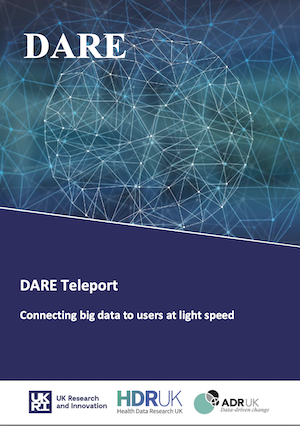
"Data federation is an invisible part – it’s below the iceberg. People see the penguins on top of the iceberg having a nice time; they don’t see the mass of ice underneath holding the whole thing up." - Simon Thompson
In the digital age, access to comprehensive and secure data was the cornerstone of impactful research. TELEPORT revolutionized data accessibility for researchers across the UK by linking Trusted Research Environments (TREs) in Wales and Scotland, creating a federated system for seamless, secure data access.
Enhancing Research Capabilities
TELEPORT aimed to enhance the quality and scope of research by providing larger, more diverse datasets. This was crucial for studies on rare diseases and common conditions, enabling complex analyses without the constraints of isolated data silos.
Researchers had tools to delve deeper into their studies, leveraging extensive datasets to uncover insights previously out of reach. This interconnected approach allowed for a more holistic understanding of health conditions, fostering breakthroughs that led to improved treatments and interventions.
Secure and Efficient Data Access
Security was paramount in TELEPORT’s framework. The system ensured data access in a secure environment, maintaining confidentiality and integrity while speeding up the research process.
By implementing robust security measures, TELEPORT guaranteed that sensitive information remained protected, giving researchers confidence to focus on their work without concerns about data breaches or privacy issues. This commitment to security also ensured compliance with ethical standards and regulations, safeguarding both the data and the individuals it represented. A Collaborative Effort
The success of TELEPORT hinged on collaboration between various institutions and stakeholders. By fostering a cooperative environment, the project aimed to break down barriers and promote a more unified research landscape.
Collaboration was at the heart of TELEPORT’s mission. By connecting TREs and facilitating data sharing, the project encouraged a culture of cooperation and collective problem-solving. This synergy between different research entities not only enhanced the quality of research but also accelerated the pace of discoveries, making it possible to address complex health challenges more effectively.
Conclusion
TELEPORT transformed the research ecosystem by connecting TREs across regions, enhancing data accessibility, and ensuring secure and efficient data usage. This project made significant strides in addressing complex health challenges.
Enhancing Research Capabilities
TELEPORT aimed to enhance the quality and scope of research by providing larger, more diverse datasets. This was crucial for studies on rare diseases and common conditions, enabling complex analyses without the constraints of isolated data silos.
Researchers had tools to delve deeper into their studies, leveraging extensive datasets to uncover insights previously out of reach. This interconnected approach allowed for a more holistic understanding of health conditions, fostering breakthroughs that led to improved treatments and interventions.
Secure and Efficient Data Access
Security was paramount in TELEPORT’s framework. The system ensured data access in a secure environment, maintaining confidentiality and integrity while speeding up the research process.
By implementing robust security measures, TELEPORT guaranteed that sensitive information remained protected, giving researchers confidence to focus on their work without concerns about data breaches or privacy issues. This commitment to security also ensured compliance with ethical standards and regulations, safeguarding both the data and the individuals it represented. A Collaborative Effort
The success of TELEPORT hinged on collaboration between various institutions and stakeholders. By fostering a cooperative environment, the project aimed to break down barriers and promote a more unified research landscape.
Collaboration was at the heart of TELEPORT’s mission. By connecting TREs and facilitating data sharing, the project encouraged a culture of cooperation and collective problem-solving. This synergy between different research entities not only enhanced the quality of research but also accelerated the pace of discoveries, making it possible to address complex health challenges more effectively.
Conclusion
TELEPORT transformed the research ecosystem by connecting TREs across regions, enhancing data accessibility, and ensuring secure and efficient data usage. This project made significant strides in addressing complex health challenges.


